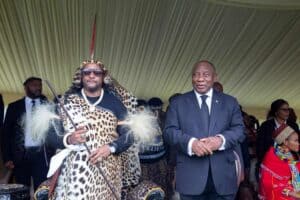One thing humans cannot change is their role in the past, whether good or bad.

The death of Zulu royal family traditional prime minister Prince Mangosuthu Buthelezi this past weekend has elicited the expected to-and-fro debates about his legacy.
Buthelezi had 70 years in one powerful position or another to shape his legacy, and as a man who was very deliberate in shaping it, it is quite telling that instead of everyone singing his praises on his death at the age of 95, he elicits strong reactions on both sides of the divide.
ALSO READ: ‘Buthelezi tried to restore lasting peace’ – Zuma
Some are screaming he was uncaring, callous and violently inclined, with others lauding him as the man who shaped not only the destiny of his people in KwaZulu-Natal, but made a huge contribution to how South Africa turned out when democracy arrived.
That he affected history is not in question, it is how he affected the historical passage of events that will have most of the country either grieving or loudly telling everyone why they will not mourn him.
He is the only leader who outlived the apartheid-created Bantustan system that sought to divide the country into unworkable enclaves of tribal groupings. It was not by chance that he outlived that system and came to be a prominent member of the democratic dispensation.
ALSO READ: OBITUARY: The life and times of Zulu Prince Mangosuthu Buthelezi
What has people saying he should not be praised is how far he went to protect and preserve the power that he had through the decades.
It is a matter of historical record that he created the party that is now the Inkatha Freedom Party (IFP) as a traditional outfit with the blessing of exiled freedom struggle leaders like Oliver Tambo, but later used it as an instrument to first galvanise his Zulu power base, then most importantly use it as a political instrument that kept him in power way past the apartheid years into democracy.
It is also a matter of historical record that the IFP was involved in political violence in many areas of KwaZulu-Natal, as well as several hotspots in Gauteng.
The violence that involved the use of all sorts of guns was later proven to have been fomented by the apartheid security machinery that supplied weapons to the IFP. And Buthelezi was head of the IFP through all that violence.
ALSO READ: IFP founder Prince Mangosuthu Buthelezi to be laid to rest on Friday
South Africa will also remember the man who, for decades, was the power behind the Zulu throne. Although he himself was only a prince by virtue of his being a great-grandson of the great King Cetshwayo, for many decades he held the power that could decide whether the throne survived or died.
And because he held political power in KZN through six decades, he could decide when and how the royal family would be at his disposal and how to strategically position the family to his political advantage.
This country will also not forget his brinkmanship in the lead-up to the 1994 election, when, in the midst of crippling political violence, he held out on being party to the election until just eight days before the actual election – to the extent that the IFP had to be added as a clip-on to the already-printed ballot papers.
That a man’s legacy requires debate is in itself telling. He shaped history and people’s destinies. He installed the current Zulu king almost singlehandedly, amid a royal fight.
ALSO READ: Buthelezi’s ‘heir’ to be announced
But that does not erase or change what happened before then. Through his organisation, the Inkatha Freedom Party and its activities before the dawn of democracy, he shaped a legacy that leaves a dark shadow that towers over all his other commendable achievements.
One thing humans cannot change is their role in the past, whether good or bad.






